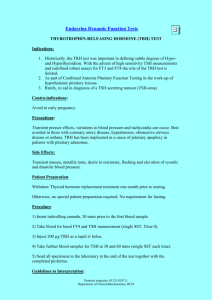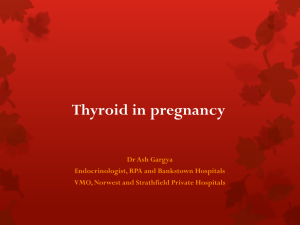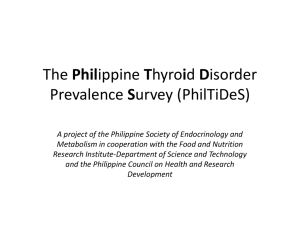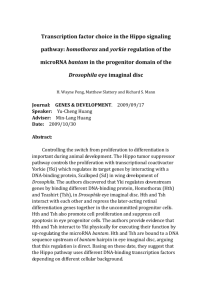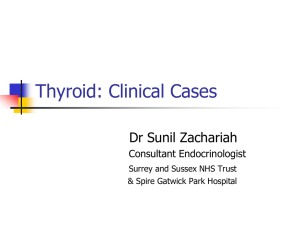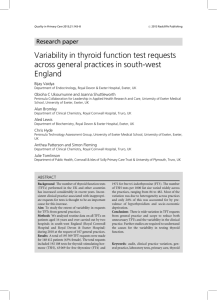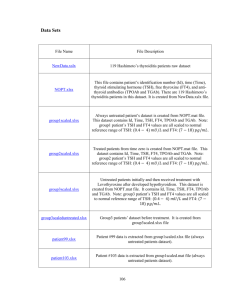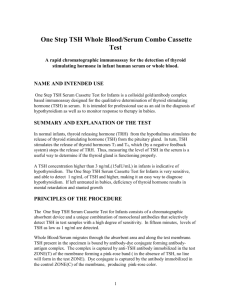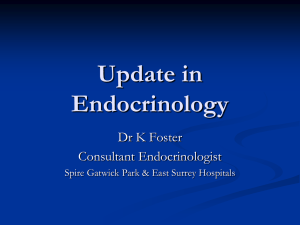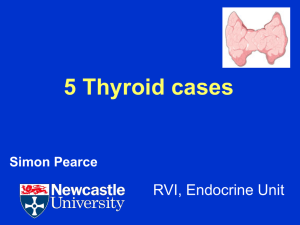Thyroid Hormone Circadian and Circannual Variation in - i-calQ
advertisement
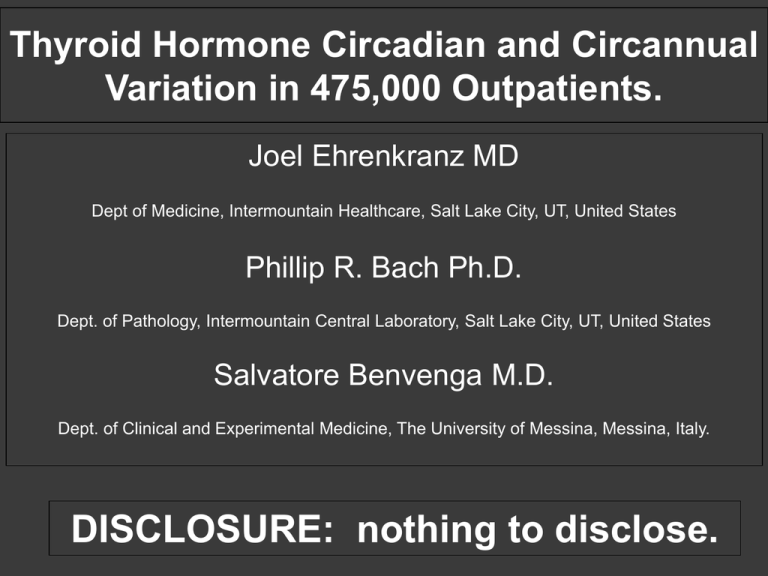
Thyroid Hormone Circadian and Circannual Variation in 475,000 Outpatients. Joel Ehrenkranz MD Dept of Medicine, Intermountain Healthcare, Salt Lake City, UT, United States Phillip R. Bach Ph.D. Dept. of Pathology, Intermountain Central Laboratory, Salt Lake City, UT, United States Salvatore Benvenga M.D. Dept. of Clinical and Experimental Medicine, The University of Messina, Messina, Italy. DISCLOSURE: nothing to disclose. Thyroid Chronobiology: Prior Observations • Multiple studies have demonstrated a circadian variation in TSH and FT3. JCEM 2008, 93(6):2300–2306 Clinical Chemistry 53, No. 2, 2007 • Small sample size • Short study duration • Many examples of seasonal variation in thyroid function and pathology: • • • • • Thyroid volume Horm. Metabol. Res. 1987; 19: 391 Radioactive iodine uptake JCEM. 1964; 24: 1084 TSH, total and free T3 and T4 levels Am. J. Human Biology. 2006;18: 99. Eur J Nutr. 2011 50:285 TSH response to TRH Ann Clinical Biochemistry 1985; 22: 371 Seasonal alterations in T4 levels among Siberian miners Int. J. Circumpolar Health 1997; 56: 134 • Neonatal TSH • Presentation of thyroid cancer PLOS ONE 2012; 7: e47770. Clin Biochem. 2013;46:133-8 British Journal of Cancer 1998 77, 1174. We undertook a large scale retrospective analysis of temporal variation in thyroid hormone levels measured in a controlled and calibrated manner. Methods and Materials • • • Data analysis extracted from Intermountain Healthcare (Salt LakeCity, Utah) Electronic Data Warehouse. • Data collected 6/2010-5/2013 Serum TSH, FT4, FT3 measured by Abbott Architect immunoassay • external controls performed daily Subjects • 25% males, ages 0-103 years • 75% females, ages 0-105 years • Outpatients • Outpatient clinics • Emergency departments • Same day surgery centers • Specimen collection from urban and rural clinics and hospitals throughout Utah and southern Idaho. • Includes individuals on any thyroid medication • Neonatal TSH screening % Patient N and Type by Time of Day 100 190773 90 80 7539 70 60 803 862 ED % 50 40 2169 30 20 4754 10 0 MN-6 AM 6 AM - 7 PM 7 PM - MN OUTPT. % Circadian Variation Thyroid Tests vs Hour of Day 8.00 TSH Mean (mIU/L) 7.00 6.00 5.00 FT3 Mean (pg/mL) 4.00 3.00 TSH Median (mIU/L) 2.00 1.00 0.00 0 1 2 3 4 5 6 7 8 9 10 11 12 13 14 Hour Specimen Collected FT4 Mean (ng/dL) N TSH and FT4: 205,53 FT3: 58,993 15 16 17 18 19 20 FT4 Median (ng/dL) 21 22 23 Normalized Circadian Variation in TSH and FT3 Nocturnal TSH Surge by Gender, Age, Rx N TSH and FT4: 164,094 FT3: 47,667 201305 201304 201303 201302 201301 201212 201211 201210 201209 201208 201207 201206 201205 201204 201203 201202 201201 201112 201111 201110 201109 201108 201107 201106 201105 201104 201103 201102 201101 201012 201011 201010 201009 201008 201007 201006 Circannual Variation TSH FT4 FT3 by Month 5.00 4.50 4.00 3.50 3.00 FT3 Mean 2.50 TSH Median 2.00 TSH mean 1.50 FT4 Mean 1.00 0.50 0.00 Conclusions • TSH • rises significant at night and remains constant between 6 AM and 7 PM. • nocturnal surge varies by age and gender and is present independent of medication for thyroid disease. • shows an inconsistent pattern of rising in November and December. • FT3 • peaks following the 2-3 AM rise in TSH. • remains constant throughout the year. • FT4 • is constant throughout the 24 hour cycle. • has no annual periodicity. Clinical Implications • Reference range for TSH needs to take into account time of day. • Further studies are necessary to determine whether TSH has an annual rhythm and if monthly reference ranges are needed. • A single measure of TSH between 6 AM and 7 PM as an indicator of TSH suppression may not be sufficient.


